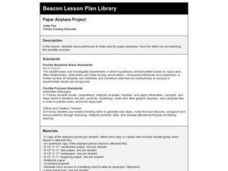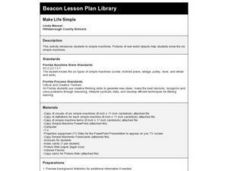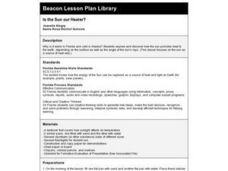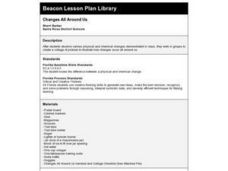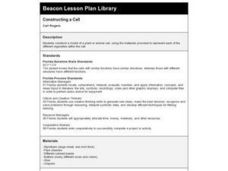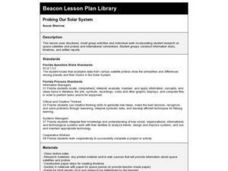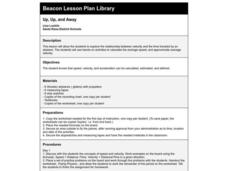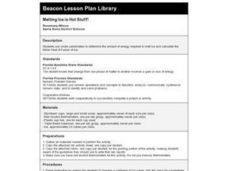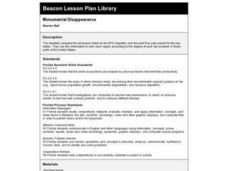Curated OER
Oh, Let the Rain Fall Down
Fifth graders explain the three phases of the water cycle in a narraive paragraph where they describe the journey of a single raindrop. They are introduced to five science vocabulary words and personfication.
Curated OER
Make Life Simple
Students examine six simple machines by looking at pictures of real world objects.
Curated OER
Life And Death
Students participate in an interactive game to review how living things are classified.
Curated OER
IS THE SUN OUR HEATER?
Students explore and discover how the sun provides heat to the earth, depending on the surface as well as the angle of the sun's rays.
Curated OER
FLIGHT FAIR
Students conduct their personal investigations into paper airplane flight. Cooperative teams are formed, with students choosing the paper airplane design that they are most interested in building.
Curated OER
Changes All Around Us
Sixth graders, in groups, observe the difference between physical and chemical changes and create a collage of pictures to show the difference.
Curated OER
Constructing a Cell
Third graders, in groups, make a model of a plant or animal cells and represent each of the organelles in the cell.
Curated OER
Invertebrates, No Backbone, No Problem
Third graders research an invertebrate, create a poster about it, then present it to the class.
Curated OER
Let's Get Moving
Students participate in sports activities that relate to motion, velocity and momentum. They produce a PowerPoint presentation after researching the activities.
Curated OER
Mind Games
Young scholars design a prototype game as they simulate being game designers for a major corporation. They base the game on the major body systems.
Curated OER
Projectile Motion
Students observe projectile motion and calculate the speed of a baseball based on the time and distance traveled. They record the time, measure the distance, and draw the path of the ball's travel on a data table.
Curated OER
Probing Our Solar System
Third graders engage in a lesson utilizing small group activities and individual work incorporating student research on space satellites, probes and international connections. They, in groups, construct information disks, timelines, and...
Curated OER
Physical or Chemical? That Is the Question
Students find examples of physical and chemical changes using the five Web World Wonders camera sites.
Curated OER
The Energy Grab Game
Eighth graders explore the scarcity of energy resources. They also explore the competition for natural resources and the inadequate distribution of natural wealth among the Earth's nations.
Curated OER
Up, Up, and Away
Middle schoolers study the concepts of speed and velocity and complete practice problems. In small groups, students fly airplanes and record time and distance traveled for each flight. They calculate the speed and velocity of their plane...
Curated OER
To Be or Not to Be - Abiotic/Biotic Factors
Students define and compare/contrast abiotic and biotic factors presented while using web cameras on the Web World Wonders website.
Curated OER
What Is in a Rock?
Students identify, sort, and classify mineral samples that make up a common rock.
Curated OER
Do You Know the Master Programmer?
Fourth graders, using candy, build models of DNA replication, RNA transcription, and tRNA translation.
Curated OER
Enzymatic Action
Students observe how a cell uses an enzyme to rid itself of a poisonous substance by experimenting with hydrogen peroxide, potatoes, liver and carrots. They record the temperature and changes of the hydrogen peroxide as other elements...
Curated OER
Introduction to Classification
Fourth graders design a classification system to categorize animate and inanimate objects. They discuss the advantages of grouping things as they classify buttons, leaves, shells.
Curated OER
Melting Ice is Hot Stuff!
Fourth graders determine the amount of energy required to melt ice using a calorimeter. They calculate the Molar Heat of Fusion of Ice.
Curated OER
Monumental Disappearance
Fourth graders compare the emissions listed on the EPA isopleths over the past five-year period for ten key states. They use this information to rank each region according to the degree of acid rain problem in those parts of the United...
Other popular searches
- Science Learning Centers
- Math Learning Centers
- Hands on Learning Centers
- Measurement Learning Centers
- Space Learning Centers
- Literacy Learning Centers
- Alphabet Learning Centers
- Ideas for Learning Centers
- Electricity Learning Centers
- Hand Math Learning Centers
- Easy Math Learning Centers
- Planet Learning Centers



